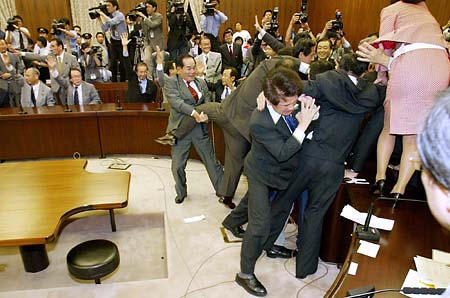| Israel, working with deeply-embedded intelligence moles in the
United States, including within the U.S. government and
"off-the-books" intelligence front companies, has been pilfering
spent U.S. nuclear fuel from American nuclear arms caches at a
phenomenal rate over the last several years. U.S. and foreign
intelligence sources have confirmed that much of the nuclear fuel
has been shipped to Israel and other locations via the port of
Houston.
The illegal smuggling of spent highly-enriched uranium (HEU) and
plutonium fuel from U.S. nuclear weapons facilities is the same
outbound Houston shipping pipeline used by Bush-influenced Carlyle
Group and the firm's front companies in Spain and France to ship
precursor nerve gas chemicals to Saddam Hussein's Iraq in the 1980s,
according to one Pentagon intelligence source.
The nuclear smuggling is a major back story to a September 8
Government Accountability Office (GAO) report titled "Nuclear
Nonproliferation: U.S. Agencies Have Limited Ability to Account for,
Monitor, and Evaluate the Security of U.S. Nuclear Material
Overseas." The most serious finding in the GAO report states:
"DOE [Department of Energy], NRC [Nuclear Regulatory Commission],
and State are not able to fully account for U.S. nuclear material
overseas that is subject to nuclear cooperation agreement terms
because the agreements do not stipulate systematic reporting of such
information, and there is no U.S. policy to pursue or obtain such
information. U.S. nuclear cooperation agreements generally require
that partners report inventory information upon request, however,
DOE and NRC have not systematically sought such data. DOE and NRC do
not have a comprehensive, detailed, current inventory of U.S.
nuclear material--including weapon-usable material such as highly
enriched uranium (HEU) and separated plutonium--overseas that
includes the country, facility, and quantity of material. In
addition, NRC and DOE could not fully account for the current
location and disposition of U.S. HEU overseas in response to a 1992
congressional mandate. U.S. agencies, in a 1993 report produced in
response to the mandate, were able to verify the location of 1,160
kilograms out of 17,500 kilograms of U.S. HEU estimated to have been
exported. DOE, NRC, and State have established annual inventory
reconciliations with five U.S. partners, but not the others it has
transferred material to or trades with."
The report also states that a nuclear cooperation agreement
between the United States and Israel was allowed to lapse. The GAO
report also states: "DOE's Global Threat Reduction Initiative (GTRI)
removes U.S. nuclear material from vulnerable facilities overseas
but can only bring back materials that have an approved disposition
pathway and meet the program's eligibility criteria." WMR has been
informed that because of the amount of HEU and plutonium smuggled
from the United States outside of "approved disposition pathways,"
there is no way for the United States to know exactly where HEU and
plutonium has been distributed, especially to unauthorized end-users
who have been using the spent nuclear material in violation of the
nuclear non-proliferation treaty (NPT) or U.S. export control laws.
Countries that fall into this category, according to our sources,
include Japan, Israel, South Korea, North Korea, Saudi Arabia,
India, Syria, Iran, Burma, Egypt, Turkey, Taiwan, and Pakistan.
The major reason behind the nuclear material smuggling from the
United States stems from Israel quietly re-establishing its global
nuclear smuggling operations, rampant during the 1960s when it was
working to acquire nuclear weapons. Israel's Dimona nuclear reactor
capabilities have always been clouded in maximum secrecy but it is
known that the facility suffered a major equipment failure in the
1990s that impacted on Israel's ability to re-process nuclear fuel.
The diminished capabilities of the Negev Nuclear Research Center
prompted Israel, in the 1990s, to actively smuggle nuclear
materials, including enriched plutonium, to Israel. The smuggling
operations immediately became known to the CIA's
Counterproliferation Division and its non-official cover (NOC)
Brewster Jennings & Associates operation headed up by Valerie Plame
Wilson's. It was a major reason why Vice President Dick Cheney, his
counsel Scooter Libby, State Department Undersecretary for Political
Affairs (and President Obama's current envoy to Afghanistan and
Pakistan) Marc Grossman, and others within the Bush administration
exposed the Brewster Jennings operations.
Israel's search for replacement enriched plutonium hit pay-dirt
when its intelligence service discovered that the Pantex nuclear
facility near Amarillo, Texas, stores enriched plutonium fuel that
is 99 percent pure plutonium that does not require reprocessing for
another 60 to 90 years. Israel gained access to the classified
details of the Pantex operation by tapping into classified
government communication networks through the Israeli-owned
communication company AMDOCS. The Israelis discovered that only U.S.
nuclear cores composed of plutonium alloys were ripe for theft at
Pantex. The 99 percent plutonium fuel was more well-guarded.
However, the older plutonium alloy cores were unstable and the
shipment of the cores through the port of Houston required
refrigerated containers to keep them cooler than 150 degrees.The
Israelis used refrigeration trucks to move the cores through the
port of Houston from Amarillo and into refrigeration containers
loaded on board ships belonging to Zim-American Israeli Shipping
Company, a firm with close links to the Mossad. The plutonium cores
were shipped to Israel and Dimona.
One individual who had the port of Houston under close scrutiny
was CIA contractor/informant/source Roland "Tony" Carnaby. Carnaby
had set up a number of video surveillance cameras at the port of
Houston and routinely uploaded the stored videos from the camera
units to his Macintosh computer. WMR has learned from intelligence
sources that Carnaby possessed a major secret about the smuggling
operation: much of the nuclear material being shipped through
Houston by Israel, more than its needs, was being re-sold by Israel
on the international black market. On April 29, 2008, Carnaby was
shot to death by two Houston police officers after what was reported
to have been a high-speed chase by police. After he was killed, the
Houston police took possession of Carnaby's Macintosh computer. WMR
previously reported that Carnaby kept Israeli intelligence assets
and agents under close scrutiny in Houston and that he had a strange
encounter with an Israeli Consulate General official the evening
before he was shot. WMR also previously reported on Mossad's
penetration of the Houston Police Department and the Harris County
Sheriff's Office. Radiation detectors routinely scan containers at
Houston for the presence of nuclear materials, hence, it was
important for the Mossad to counteract Carnaby's security systems at
the port.
It is known that Carnaby used a number of cell phones to dial
into port video cameras to turn them on, stop them, and download
captured video data. However, an Israeli firm, Orsus, was scheduled
to begin installation of its own surveillance at the port, putting
Carnaby's surveillance operations in jeopardy. The financial backers
of Orsus include ComSor Venture Fund LDC, a joint operation of
Comverse Technology, which includes its subsidiary Verint Systems,
and Soros Fund Management's Quantum Industrial Holdings Ltd. Other
investors in Orsus include Israel's Koor Industries, the leading
shareholder of Tadiran, the Israeli defense electronics firm; Cial
Industries and Investment, an Israeli holding company; the Cedar
Fund, an 'Israeli-related' venture capital firm; Israel Infinity
Venture Capital Fund; and Poalim Capital Markets, a subsidiary of
Bank Hapoalim, Israel's largest bank."
Carnaby was, reportedly, working with the FBI on the Israeli
nuclear smuggling issue and the FBI office in Houston requested that
the Houston police call off their chase of Carnaby. It was too late
for Carnaby. He was marked for assassination by Mossad and its
friends in Houston area law enforcement because of his knowledge of
the nuclear smuggling program. Israel was also concerned that
Carnaby, a Lebanese-American with close ties to some of Lebanon's
political groups opposed to Israel, might leak details of the
operations to his Lebanese friends, information that would soon end
up in the hands of Iranian and Syrian counter-intelligence.
One of the countries that received re-sold American plutonium
fuel from Israel was Japan. However, the Japanese soon discovered
that the plutonium for which they were paying the Israelis top
dollar was too old and provided only short-life usable nuclear
weapons. Japan decided to go it alone on their nuclear weapons
development but not before they planned to blow the whistle on the
Israeli and American smuggling operation to the International Atonic
Energy Agency (IAEA). Before the Japanese could act, the super-quake
struck Japan, along with the devastating tsunami. At that point in
time, Israel and the Americans programmed their Stuxnet computer
virus to trigger the nuclear catastrophe at Fukushima, the major
site for Japan's nuclear weapons development program. Stuxnet,
developed to disrupt Iran's nuclear program, is also effective
against the nuclear power generation systems of other nations using
standard supervisory control and data acquisition (SCADA) software,
including the plutonium MOX fuel processing operations at Fukushima.
Stuxnet can be used to blackmail recipients of the smuggled
plutonium material, including MOX fuel, into silence. The Fukushima
disaster destroyed physical evidence of the Israeli smuggling
operation to Japan. However, Japanese intelligence possesses other
evidence of the Israeli smuggling operations.
The recent explosion at a MOX fuel plutonium processing facility
at the French Marcoule nuclear power plant was a warning to France,
courtesy of Stuxnet, not to support Palestine's bid for UN
membership. It is not yet clear whether the MOX being used at
Marcoule was developed from the unstable and old American plutonium
cores smuggled and re-sold by Israel. However, U.S. intelligence has
evidence that Israel has re-sold some of its stolen plutonium
material to India in return for that nation providing Israel with
missile systems and related technology.
The disassociation of the CIA and FBI from interest in Carnaby's
murder in Houston was directly linked to the power of the Israel
Lobby in Washington, which will stop at nothing to ensure that
Israeli crimes and intelligence activities in the United States
remain unexposed and unpunished.
|

